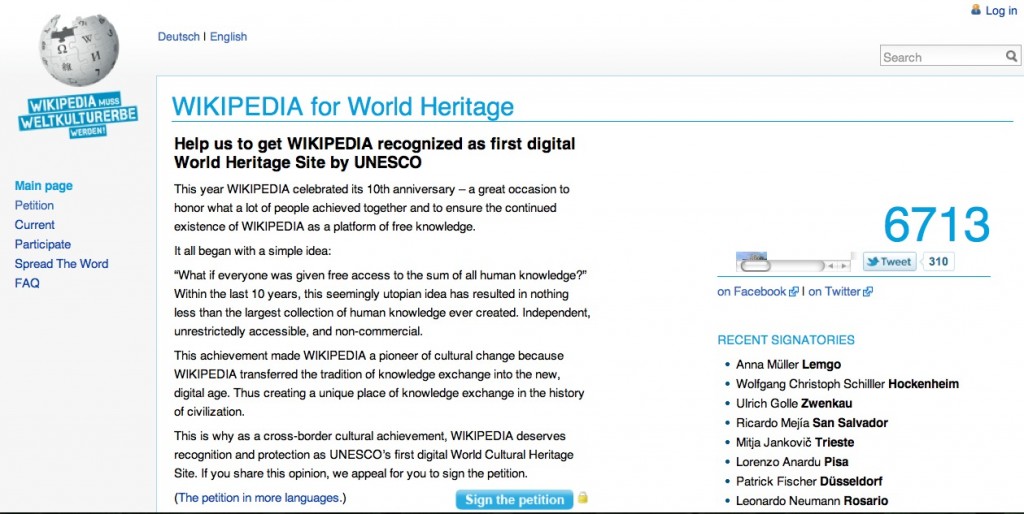Wikipedia – a global treasure?
To some it might sound like a hoax, but Wikipedia is applying for UNESCO World Heritage status. After all the global online encyclopaedia, that has just celebrated its 10th anniversary, gets 40 million visitors a month, is listed as one of the top ten most-visited Web sites, and has archived more than 18 million entries in 279 languages.
Wikipedia is a cultural phenomenon
This week Wikipedia launched a petition to acquire a spot on one of the world heritage lists of the U.N. Educational, Scientific and Cultural Organization (UNESCO).
“Wikipedia is not just a website, just a technology story, but its a cultural phenomenon… its about people coming together and sharing knowledge”, says Jimmy Wales, founder of Wikipedia in an interview with the dpa news agency. Acquiring UNESCO world heritage status he says: “would be a delightful recognition of the accomplishment that all those thousands of people who have been working in Wikipedia. And it would raise awareness for free knowledge”.
An uphill battle
And yet, there’s no doubt the road to join the pyramids or Angkor Wat will be a long and complicated campaign. First of all UNESCO has several categories, the most prestigious one being the World Heritage List, which so far includes only historic monuments and natural sites – like the Great Barrier Reef, the Grand Canyon or the Great Wall of China. Then there’s also UNESCO’s Intangible Cultural Heritage List. This includes endangered traditions and practices – like flamenco dance or French food. UNESCO does not only recognize physical monuments and sites, “but also ideas, movements and concepts” says Jimmy Wales. As a cross-border cultural achievement, he argues, Wikipedia deserves recognition and protection as UNESCO’s first digital World Cultural Heritage Site.
We do not expect you to trust us
Within the last 10 years, Wikipedia has become the largest collection of human knowledge ever created. More and more people are turning to it as a valuable source of information. Journalists included. But how reliable and trustworthy is this newest aspirant to the World Heritage List? After all Wikipedia’s authors and editors are also its users – an unpaid, partially anonymous army, some of whom insert jokes, exaggeration and even outright lies in their material.
No one is more aware of these pitfalls than the leadership of Wikipedia themselves. Their online disclaimer reminds users that “anyone with an Internet connection” can alter the content and cautions “please be advised that nothing found here has necessarily been reviewed by people with the expertise required to provide you with the complete, accurate or reliable information”. An even more blunt assessment apprears in Wikipedia’s “Ten things you may not know about Wikipedia”
Wikipedia for journalists
Here are 8 points journalists should keep in mind when delving into the world’s largest online encyclopaedia:
1. Wikipedia is an almost inexhaustible fountain of information. It can be a good place to start your research, but should never be the last.
2. Avoid taking information at face value. Always double check.
3. As a collaboratively-written secondary source, it’s risky and often inappropriate to cite Wikipedia as a source. Wikipedia’s best journalistic use is for background research rather than as a source to be quoted.
4. Have a close look at the sources cited and track them back. No citations? This should start to ring alarm bells.
5. Articles should always be checked for vandalism, and those enduring edit wars should be treated with great scepticism.
6. It might be overwhelming to look at, but make sure to view the history of an article, as this might be critical for evaluating articles.
7. Finally keep in mind: some media companies even forbid their journalists to use Wikipedia.
8. And as Wikipedia themselves say, don’t use Wikipedia to make “critical decisions”.
Author: Barbara Gruber






Feedback